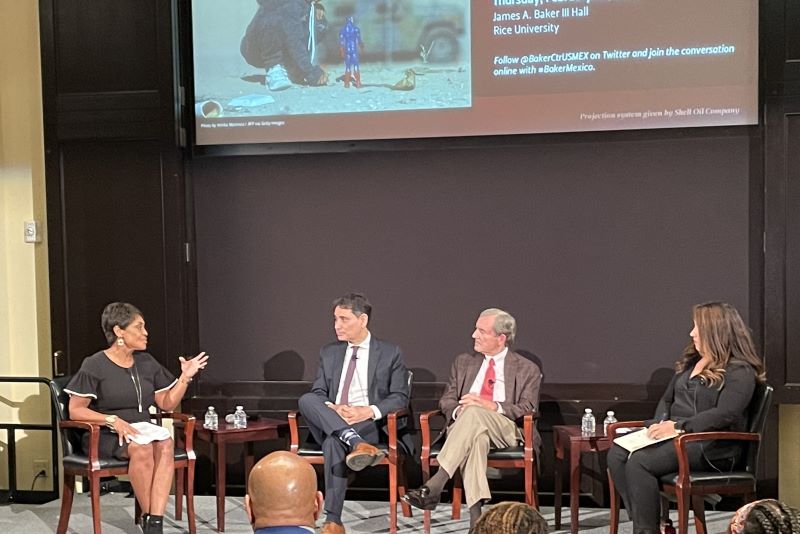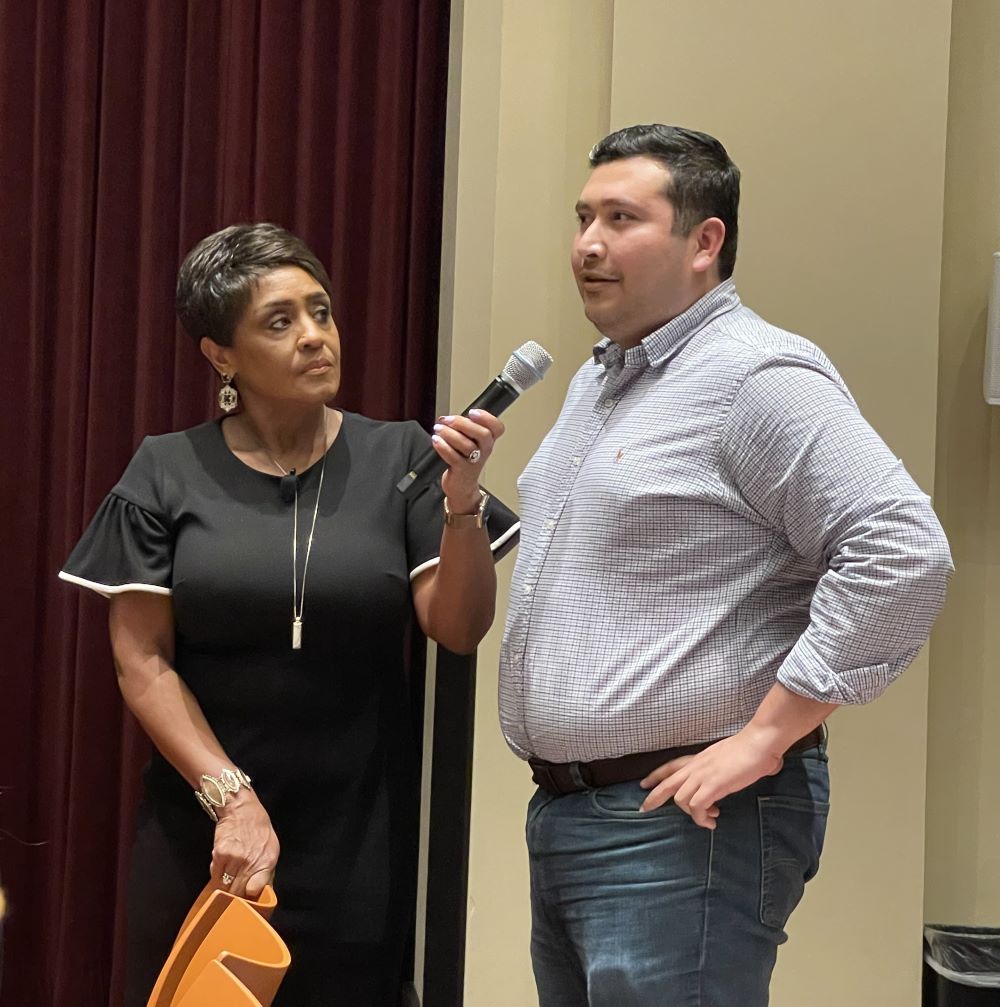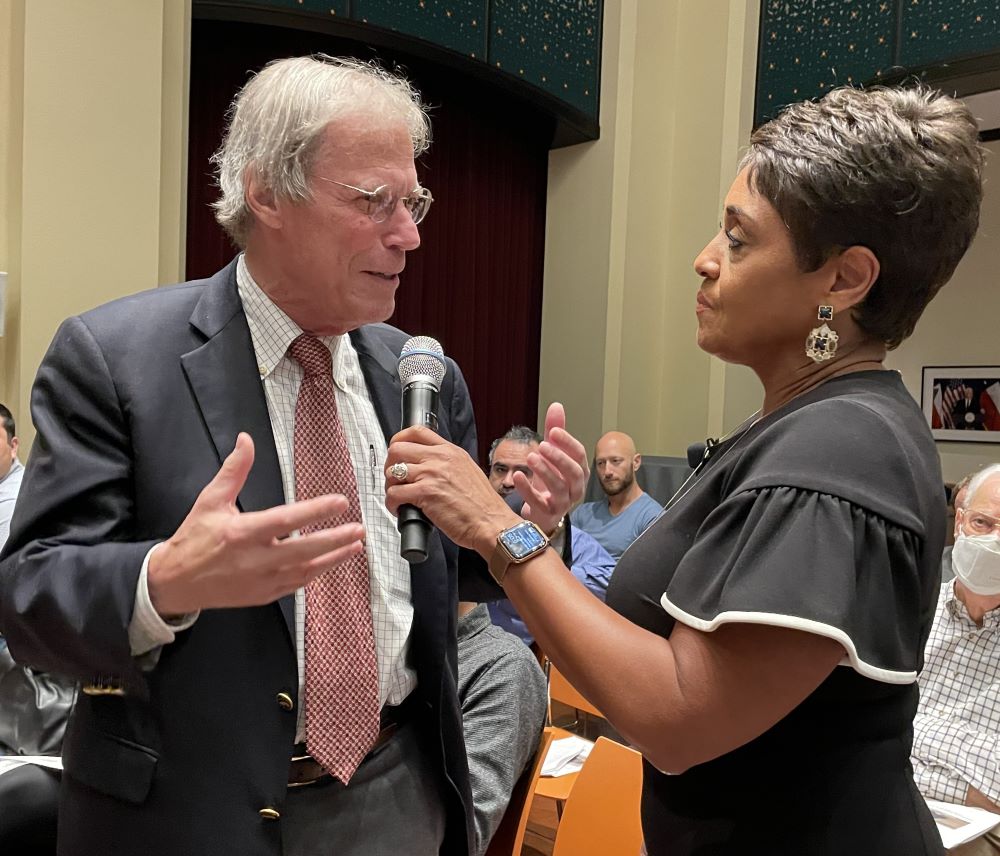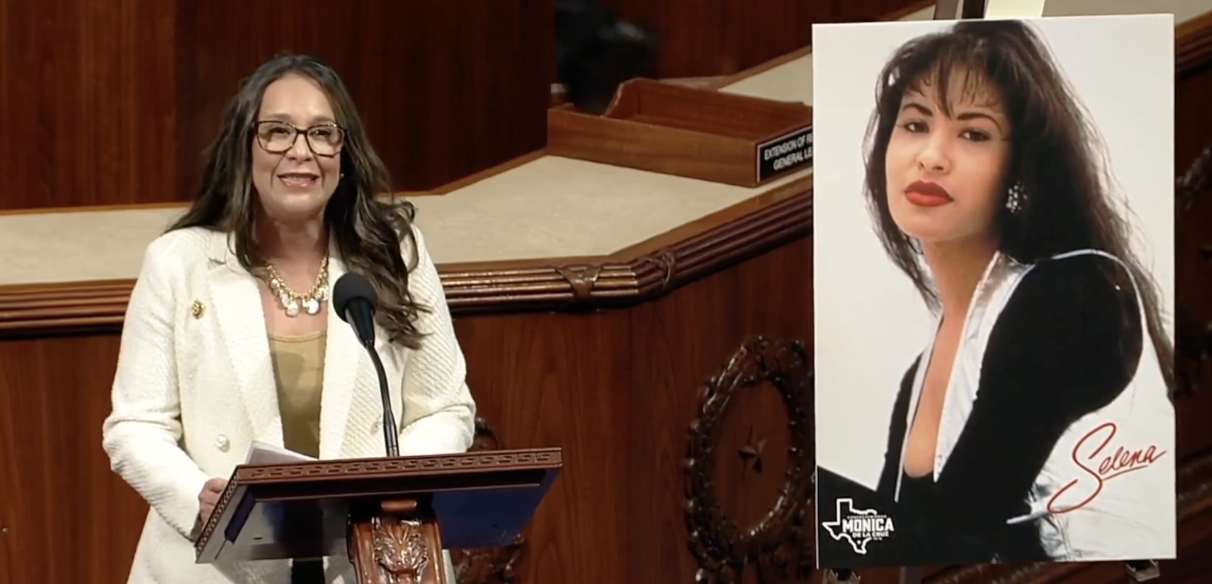Houston Town Hall Highlights Immigration-related Challenges and Calls for Sensible Policy Solutions
 A recent town hall discussion in Houston highlighted how a lack of needed immigration reforms is resulting in a humanitarian crisis for US children and stunting the growth of our nation’s workforce. Business leaders, immigration experts, and concerned citizens examined the unique challenges that children with immigrant parents face. They also called for sensible policy solutions including DACA legislation and ID and Tax.
A recent town hall discussion in Houston highlighted how a lack of needed immigration reforms is resulting in a humanitarian crisis for US children and stunting the growth of our nation’s workforce. Business leaders, immigration experts, and concerned citizens examined the unique challenges that children with immigrant parents face. They also called for sensible policy solutions including DACA legislation and ID and Tax.
Journalist and business owner Linda Lorelle moderated a panel discussion between Stan Marek, CEO of MAREK, Tony Payan, Director of the Center for the United States and Mexico at Rice University’s Baker Institute for Public Policy, Linda Corchado, J.D., Director of the Children's Immigration Network for Children at Risk, Sharon Watkins Jones, Chief Equity Officer for Children at Risk, and a large crowd at Rice University’s Baker Institute for Public Policy on February 23. The town hall was also co-sponsored by the Center for Houston's Future and Rational Middle.
A key topic of discussion was the large number of children in immigrant families who live in Texas and concerns about how they are affected by US policies related to their immigration statuses and that of their parents. These conversations highlighted the need for legislation that would create a currently non-existent pathway for unauthorized immigrant parents of US children to earn legal status.
Jones revealed that one in every three children in Texas live with one or more immigrant parents, that 109,090 are active DACA recipients, and that around 133,000 lack legal immigration status. She talked about some of the unique stresses that these children face.
“There are 1 million students of English as a second language in our classrooms who are in the midst of their growth and development. These new American children face a plethora of unique challenges, including anxiety and stress surrounding their immigration status or that of a family member. New American children are also more likely to experience culture shock or lack access to high quality public education,” said Jones.
“Immigrant communities face specific barriers to receiving critical information regarding pregnancies, including access to affordable medical care, language barriers, misinformation, and medical mistrust. In Texas, that means 5 million people, or 17% of the population, are at risk of not getting potentially lifesaving information. Additionally, many immigrant children and families don't have access to care they're otherwise eligible for because of their legal status. Over 850,000 children in Texas have undocumented parents, and about 1.2 million children have a parent that is a legal permanent resident. Current federal law requires citizenship or five years of permanent residency for Medicaid eligibility,” she said.
“Basic needs, including sleep, are of concern. Family separation due to deportations and immigration detention is traumatic for immigrant families in Texas. These fears create serious health consequences through anxiety, PTSD, and depression, all factors that seriously disrupt the child's sleep routine,” added Jones.
A documentary video by the Rational Middle of Immigration that was screened to the audience also emphasized that while many of these children are US citizens, not only do they often not receive public benefits as a result of their parents’ lack of legal status, but they are often traumatized by thoughts of being separated from their parents, which has significant negative long-term effects on these individuals who will ultimately make up a large portion of our future workforce.
Marek also echoed this point, saying “We have at least two and a half million undocumented immigrants Texas…and many of those are kids. And those kids are part of our future. And if we don't take care of those kids, give them the skills that they need and the motivation and pride of being an American, we've lost a generation.”
“When my family came here, they recognized the American dream. The kids of today, they're not going to have the same opportunity. They're going to face poverty and challenges… we need to think about Texas,” he added.
Another point of discussion amongst panelists was how the current inflationary workforce shortages that are hindering the US economy could be alleviated by sensible immigration reforms including a legislative solution for DACA recipients and also for Dreamers who came to the US as children but lack legal status.
“Workforce needs are at a point where in every industry across the country, certainly in our state, but literally across the country, there are workforce shortages,” pointed out Lorelle.
“There are an estimated 1.7 million Dreamers that would be eligible for DACA but can't get it because new applications were stopped during the Trump Administration and Congress refuses to deal with it. It's a political tool. Think about it, how many nurses do we need right now? How many schools do we need? How many policemen? And to lawmakers, I say, ‘look, why don't you say that if any potential Dreamer will get a nurse degree, you'll get a green card,’” said Marek.
Marek highlighted the benefits of DACA, a program that has allowed immigrants who came to the US as children without legal status to earn temporary renewable legal status. He cited the story of Jose, a DACA recipient in attendance, who was able to build a career and become a MAREK project manager of a crew of 100 workers working on the construction of a hospital in Houston because he was able to obtain legal status through DACA.
 In response to a question from Lorelle about whether unauthorized immigrants would come out of the shadows to earn legal status if lawmakers gave them the opportunity, Jose said they would.
In response to a question from Lorelle about whether unauthorized immigrants would come out of the shadows to earn legal status if lawmakers gave them the opportunity, Jose said they would.
“I was given the opportunity and I took it. And just think about all those people that are undocumented, they're working washing dishes. And imagine if you give that person an opportunity…if they take it, they can work wherever they want… a lot of people will take it in order to better themselves,” he said, highlighting how work permits enable those who lack them to get better jobs and become more productive members of society.
In 2017, President Trump rescinded the DACA program and asked Congress to legislate a replacement for it. Although there have been several bills sponsored over the last five years to create a legislative solution for DACA, none have been able to garner enough bipartisan support from lawmakers to pass both chambers of Congress. The program is now on life support as it faces legal battles in the federal courts.
“I have two more years to stay here. From there, I don’t know, I'm going to be here, or I might not in two years,” said Jose in a solemn tone, providing an example of how a lack of congressional action to provide a legislative solution for DACA has created instability for many hardworking Texan immigrants who came to the US as children.
In addition to a legislative solution for DACA, a key solution that speakers called for is a policy called ID and Tax. Marek explained that the policy involves creating a method for unauthorized immigrants to earn legal status and obtain a biometric ID, which would allow them to work for employers that deduct and match taxes. This would help to level the playing field for tax-paying businesses and workers.
“Think about the 11 to 20 million people who are here. They're all working, they're trimming your lawns, they’re taking care of your kids, they're cooking, they're building your building. We're not going to deport them, there's just no way. First of all, to round 'em all up would cost billions. And if we did, it would destroy our economy… So why don't we just say, ‘okay, you’ve been here five years, come in to Homeland Security, if you can pass a background check, you can go work for an employer who pays taxes like the rest of us,” said Marek about ID and Tax.
“You take 1 million undocumented people who are in the shadows and put them on a W2 payroll, and that generates $1.475 billion per year towards social security. Multiplied by 10, that's $14 billion a year. So, if we can do that, it will help keep our Social Security administration in cash. So that’s a solution for social security. To keep social security solvent, tax the 11 million people who are here,” added Marek about the fiscal benefits of ID and Tax.
“Wages are way too low for undocumented people, which impacts wages for all workers because they have to compete against low wages. If we gave them work permits, the wages would go up. An ID and Tax bill would raise wages for everybody,” he said of the numerous benefits of such a policy.
Another topic that speakers discussed was visa reform, and how the lack of pathways for economic migrants to come legally to work the jobs that the US needs filled contributes to traffic at the border.
Corchado explained that the Biden Administration’s recently implemented border policy that allows migrants from Cuba, Haiti, Nicaragua, and Venezuela to apply for entry to the US from their home countries resulted in a significant decrease of migrants from those countries at the border.
“In December, 84,000 people from these countries were presenting themselves at the border trying to enter the US, and after they made this policy it dropped to 11,900. So that means that when migrants know there are legal pathways, they will take that opportunity,” said Corchado.
Payan called for immigration reforms that would allow the federal government to adjust flows of legal immigration in various sectors of the US economy based on their dynamic needs. He also said that the US needs to increase visa paths in order to continue growing the US workforce and prevent population decline.
“A future bill ought to be indexed to economic performance… for example, the number of vacancies in the market, the types of vacancies, then you delegate the discretion to the bureaucracy to increase or decrease the number of visas that can be issued to workers based on how the economy is performing…The fertility rate in the United States is currently at 1.7. You need 2.1 just for replacement to maintain the population. Most of us are getting older. Think about Social Security and who is going to work to support it. The number of visas and visa paths that we have in the system are just not enough… We don't have the workers needed to fill the gap. That means that this economy, as vibrant as it is, needs a lot more workers in the visa paths,” said Payan.
 Lorelle explained that most Americans support common sense immigration reforms along the lines of those mentioned and questioned speakers on why lawmakers don’t pass them.
Lorelle explained that most Americans support common sense immigration reforms along the lines of those mentioned and questioned speakers on why lawmakers don’t pass them.
“After decades of inaction to fix our broken immigration system, there are clear signs that the American public, certainly all of us in this room, across the political spectrum, want our leaders to pass common-sense immigration reform,” she said, citing a recent poll that found that 73% of registered voters, including 70% of conservatives, support prompt legislative action to provide a permanent solution for Dreamers, provide border security, and provide a pathway to meet farm workforce needs.
"I think it's obvious to all of us. This has been a wonderful discussion. It's so clear how we can do this. It's so important to regularize our workforce," said audience participant Stephen Klineberg, author of Prophetic City: Houston on the Cusp of a Changing America, and Professor Emeritas at Rice.
Marek lamented that in a two-party political system with polarized primary elections, the most radical and often loudest voices have an outsized influence on lawmakers, especially on immigration.
“It’s so convenient to be a political issue that politicians can use in their elections. In the state of Texas with our primary system, 7% of people vote. If you're a Republican running in the primary, you gotta be to the right… so the 10% on the right and the 10% on the left, they're controlling the debate for us 80%. Some way, somehow, somebody in Congress has got to get up and say, ‘look we can compromise, we can talk about these issues for the American people, and we can come up with a bill that works,” said Marek.
“There's a deal to be made in Congress for border security, DACA, and ID and Tax,” he added.







